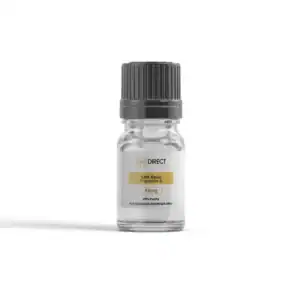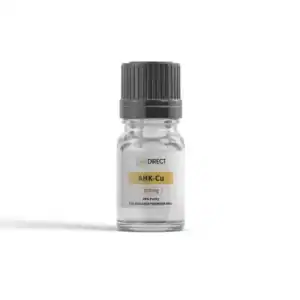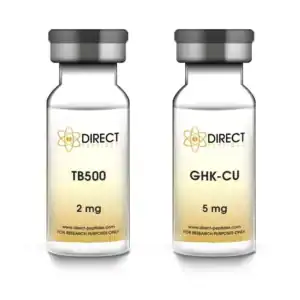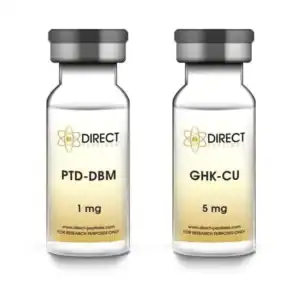£101.06
Buy GHK-Cu 200mg (Topical Peptide)
GHK-Cu topical peptide is a copper-binding peptide currently under scientific research for its potential to support collagen production, tissue repair, and skin rejuvenation. It’s used in controlled lab settings and not for direct human application.
Topical peptides are for research use only.
This product is intended for research purposes only. To be used by trained professionals only.
GHK-Cu topical peptide, a copper tripeptide complex found naturally in human plasma, has been under the microscope in skincare and regenerative research.
It’s been shown to decline significantly with age along with skin elasticity, firmness, and overall collagen production. Think of it as one of the body’s maintenance crew that takes an extended coffee break after your twenties. [1]
Scientists studying GHK-Cu are particularly interested in how it transfers copper ions to skin cells and enzymes, activating key biological processes. These include collagen synthesis, tissue repair, and healing pathways that typically slow down with aging.
GHK-Cu isn’t found in face cream or over-the-counter moisturizer formulations. Instead, it’s a common reference compound in laboratory settings to explore how peptides interact with skin types, enzymes, and plasma proteins. While it’s gaining popularity in topical peptide research, it’s used only for research not for treating any medical problem or health condition.
Europe Researchers investigating GHK-Cu topical peptide have observed a range of effects worth noting. In lab studies, it appears to encourage collagen production, elastin synthesis, and an increase in skin density. When applied to skin models, the peptide has shown the ability to reduce the appearance of fine lines and wrinkles while supporting skin firmness and hydration. [2]
In fact, its performance has even been compared to retinoic acid and vitamin C in collagen-boosting studies. The results were surprising. GHK-Cu led to higher collagen levels and more visible improvements in skin tone, texture, and firmness. One study showed it delivered the best results in increasing dermal thickness and elasticity.
Tissue remodeling is another major focus. In diabetic wound healing research, the peptide showed potential in speeding up the healing process through growth factors and improved tissue repair. GHK-Cu supported hair follicle regeneration and stimulated scalp blood flow—suggesting a potential connection to hair growth in certain models. [3]
There’s also the anti-inflammatory angle. The peptide reduced markers of oxidative stress and inflammation, which are two key players in acne development and overall skin damage. By calming the skin environment, it helped preserve moisture and strengthen the skin barrier.
Studies involving the eye area and sensitive skin have even found GHK-Cu to be better tolerated than traditional topical creams. When used in combination with zinc oxide, hyaluronic acid, or vitamin C, researchers noted enhanced hydration and resilience, particularly in dry skin models.
This peptide’s activity on enzymes linked to healing, collagen synthesis, and even connective tissue formation makes it a promising candidate in ongoing research for skincare, plastic surgery recovery, and anti-aging serum development. Its effect on complex biochemical reactions offers insights into how the human body might respond to targeted skincare ingredients in the future. [4]
To protect the peptide’s structure and prevent adverse effects in experiments, GHK-Cu should be kept in a dry place, away from direct sunlight. Many labs refrigerate the serum or powder to prevent degradation caused by oxidative stress.
As with all peptides meant strictly for research, it should never be included in consumer face cream or skincare without proper approvals. Patch tests in laboratory settings help researchers avoid adverse reactions or allergies when testing interactions with other skincare compounds.
Despite its exciting potential benefits, GHK-Cu topical peptide is not approved for drug administration or consumer use. Researchers use it under controlled conditions for its role in skincare, wound healing, and essential biological processes. Always handle with care, caution, and scientific intent.
Direct Peptides supplies high purity peptides for laboratory research purposes. Shop the full range of Topical Peptides here.
[1] Pickart L, Margolina A. Regenerative and Protective Actions of the GHK-Cu Peptide in the Light of the New Gene Data. Int J Mol Sci. 2018 Jul 7;19(7):1987.
[2] Pickart, L.; Margolina, A. Skin Regenerative and Anti-Cancer Actions of Copper Peptides. Cosmetics 2018, 5, 29.
[3] Pickart L, Vasquez-Soltero JM, Margolina A. GHK Peptide as a Natural Modulator of Multiple Cellular Pathways in Skin Regeneration. Biomed Res Int. 2015;2015:648108.
[4] Dou Y, Lee A, Zhu L, Morton J, Ladiges W. The potential of GHK as an anti-aging peptide. Aging Pathobiol Ther. 2020 Mar 27;2(1):58-61.
Molecular formula: C14H22CuN6O4
Molecular weight: 401.91 g/mo
ALL CONTENT AND PRODUCT INFORMATION AVAILABLE ON THIS WEBSITE IS FOR EDUCATIONAL PURPOSES ONLY.
DISCLAIMER: These products are intended solely as a research chemical only. This classification allows for their use only for research development and laboratory studies. The information available on our Europe Direct Peptides website: https://direct-peptides.com is provided for educational purposes only. These products are not for human or animal use or consumption in any manner. Handling of these products should be limited to suitably qualified professionals. They are not to be classified as a drug, food, cosmetic, or medicinal product and must not be mislabelled or used as such.
Buy GHK-Cu Topical Peptide 200 mg ONLINE Europe today from Direct Peptide

GHK Basic (Topical)
£24.70
AHK-Cu (Topical)
£109.08
TB500 GHK-Cu Peptide Stack
£25.83 – £34.81Price range: £25.83 through £34.81 This product has multiple variants. The options may be chosen on the product page
PTD-DBM GHK-Cu Peptide Stack
£30.50 – £39.48Price range: £30.50 through £39.48 This product has multiple variants. The options may be chosen on the product page